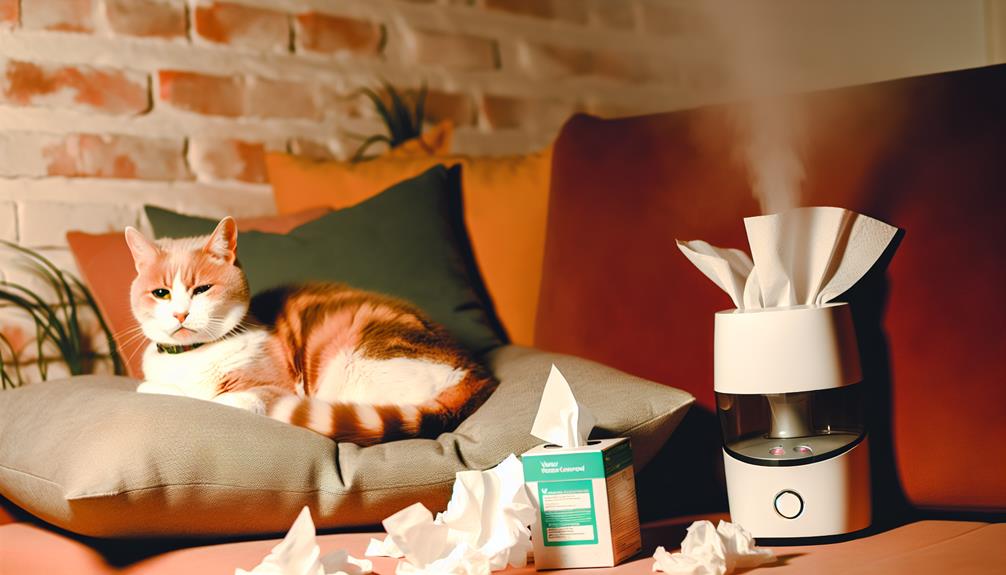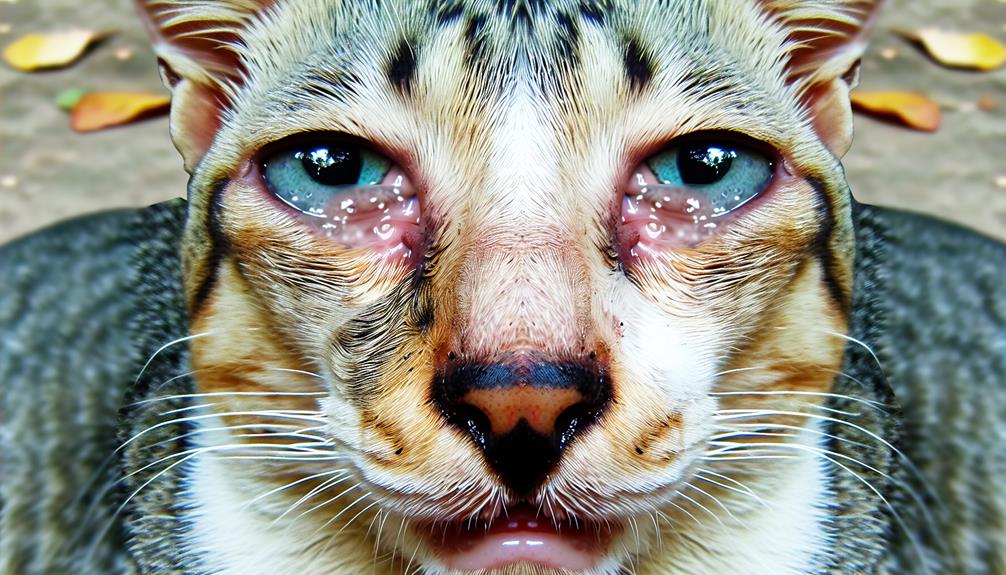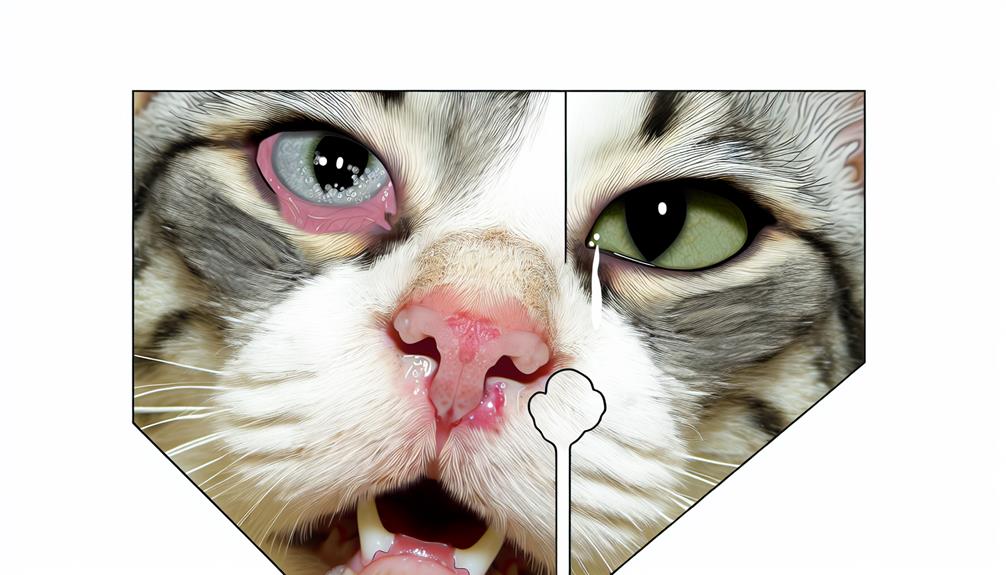Do you ever wonder why cats seem to get sick so easily? Well, one reason is because they are more prone to upper respiratory infections. These infections can cause sneezing, coughing, and runny noses in cats. But what exactly causes these infections? It turns out that there is a condition that affects cats all over the world and can really impact their respiratory health. By understanding this underlying cause, we can better prevent and manage these infections in our furry friends. So let’s dive in and learn more about why cats get upper respiratory infections!
Key Takeaways:
- Cats can get upper respiratory infections from viruses or bacteria.
- Symptoms of an upper respiratory infection in cats include sneezing, runny nose, coughing, and lack of interest in food.
- It’s important to take your cat to the vet if you notice these symptoms, as they can diagnose and treat the infection.
- Taking care of your cat’s health is crucial, so always be aware of any signs of illness.
- Learning more about how to keep your furry friend healthy can help prevent and manage upper respiratory infections in cats.
Sneezing and Nasal Discharge
Why Do Cats Sneeze and Have Runny Noses?
Have you ever wondered why your cat sneezes a lot or has a runny nose? Well, let’s find out together! Sneezing and nasal discharge are common symptoms of upper respiratory infections in cats. These infections can be caused by different things, like viruses, bacteria, allergies, and things in their environment that bother them.
Here are some common causes of sneezing and nasal discharge in cats:
- Nasal Congestion:
- When a cat’s nasal passages get all swollen and blocked, it’s hard for them to breathe properly. This leads to lots of sneezing.
- Viral or bacterial infections, like feline herpesvirus or calicivirus, are often to blame. These infections can spread easily among cats.
- Sinus Infections:
- Cats have air-filled spaces in their skulls called sinuses. When these sinuses get infected and inflamed, it can cause a lot of mucus production and runny noses.
- Sinus infections can be caused by viruses, bacteria, allergies, or other irritants.
Coughing and Wheezing
Why is My Cat Coughing and Wheezing?
Have you ever heard your cat cough or make a funny whistling sound when they breathe? It can be a little alarming, but don’t worry! Coughing and wheezing in cats can be a sign of an upper respiratory infection. Let’s learn more about these symptoms and how to help our furry friends feel better.
- What are the symptoms?
- Coughing: Cats can have a dry, hacking cough or a wet, productive cough.
- Wheezing: When a cat wheezes, it sounds like a high-pitched whistle when they breathe.
- What causes coughing and wheezing?
- Infections: Most of the time, these symptoms are caused by viral or bacterial infections.
- Allergies: Cats can also cough and wheeze due to allergies to things like dust or smoke.
- How can we help our cats?
- Treat the underlying cause: If it’s a bacterial infection, antibiotics may be needed. Viral infections usually get better on their own with supportive care.
- Keep them hydrated: Make sure your cat drinks plenty of water to help soothe their throat.
- Create a comfy environment: Provide a warm and cozy space for your cat to rest and recover.
- How can we prevent wheezing?
- Keep the environment clean: Regularly clean your cat’s living area to minimize dust and other irritants.
- Fresh air is key: Make sure the space is well-ventilated to prevent respiratory issues.
- Avoid irritants: Keep your cat away from cigarette smoke and other things that can trigger wheezing.
Eye Inflammation and Discharge
Why Do Cats Get Eye Inflammation and Discharge?
When our furry feline friends have a stuffy nose and a cough, it’s usually a sign of an upper respiratory infection. But did you know that these infections can also affect their eyes? Let’s take a closer look at why cats get eye inflammation and discharge when they have an upper respiratory infection.
Causes of Eye Inflammation and Discharge in Cats:
- Viral Infections: Two main viruses, called feline herpesvirus and feline calicivirus, are responsible for upper respiratory infections in cats. These viruses can also cause inflammation and discharge in the eyes.
- Bacterial Infections: Sometimes, bacteria can also join the party and make things worse. If a cat’s immune system is weakened, they may be more prone to bacterial infections, which can lead to eye inflammation and discharge.
Symptoms to Watch Out For:
- Redness and Swelling: If you notice that your cat’s eyes look redder than usual and are swollen, it could be a sign of eye inflammation.
- Watery or Thick Discharge: Keep an eye out for any unusual discharge coming from your cat’s eyes. It can be watery or thick and might make their fur around the eyes look wet or dirty.
- Squinting or Blinking Excessively: Cats with eye inflammation may squint or blink more often than usual. They might also be more sensitive to light, so you might notice them avoiding bright areas.
How to Treat Eye Inflammation and Discharge:
- Antiviral Medications: If the upper respiratory infection is caused by a virus, your veterinarian may prescribe antiviral medications to help manage the symptoms and speed up recovery.
- Antibiotics: If a bacterial infection is present, antibiotics can be used to treat the underlying infection and reduce eye inflammation.
- Eye Drops or Ointments: Your vet may recommend eye drops or ointments to decrease inflammation and make your cat more comfortable.
- Supportive Care: Keeping your cat’s eyes clean and providing a stress-free environment can help them recover faster.
Loss of Appetite and Weight Loss
Why is My Cat Losing Weight and Not Eating?
Have you noticed that your cat has been losing weight and not showing much interest in their food? Well, it could be because they have an upper respiratory infection. Let’s break it down and understand why this happens:
- A Smelly Situation: Cats have a super sense of smell, and when they get an upper respiratory infection, it can mess with their sniffer. The infection causes congestion and inflammation in their nose, making it hard for them to pick up on smells. And since cats rely on their sense of smell to decide if food is tasty or not, this can lead to a loss of appetite.
- Swallowing Struggles: Imagine having a sore throat or a mouth full of boo-boos – it would definitely make eating a painful experience. Well, the same goes for cats with an upper respiratory infection. The infection can cause inflammation and soreness in their throat or mouth, making it uncomfortable for them to eat. So, they might not be eating as much as usual.
But don’t worry, there are some things you can do to help your furry friend:
- Keep an eye on their eating habits and weight. If the loss of appetite and weight loss continue or get worse, it’s best to consult a veterinarian.
- Make their food more enticing by warming it up slightly or adding a little bit of yummy broth.
- Ensure they have access to fresh water at all times.
- Create a calm and quiet eating environment for them, away from any loud noises or distractions.
- Consider offering smaller, more frequent meals, as it may be easier for them to eat in smaller portions.
Lethargy and Decreased Activity
Are you worried about your cat’s lack of energy and decreased activity? It could be a sign of an upper respiratory infection! Let’s break it down and understand what’s going on with your furry friend:
🐱 Lack of energy: Cats with respiratory infections can feel really tired. They might spend more time sleeping or resting than usual.
🍽️ Reduced appetite: Along with being less active, cats with infections might not be interested in food. Their sense of smell and taste can be affected, making them eat less.
🎾 Reluctance to play: Infected cats might not feel like playing with their toys or interacting with you. They just don’t have the usual desire for playful activities.
😔 General discomfort: Cats with respiratory infections might seem unhappy or withdrawn. They might not be interested in what’s happening around them and can even appear a bit down.
If you notice these signs in your cat, it’s important to consult a veterinarian. They can give your cat a proper diagnosis and recommend the right treatment to help them get better.
Frequently Asked Questions
How Can I Prevent My Cat From Getting an Upper Respiratory Infection?
FAQs about Preventing Upper Respiratory Infections in Cats
Q: How can I prevent my cat from getting a cold?
A: To prevent your cat from getting a cold, make sure they are up-to-date on their vaccinations. Vaccines can help boost their immune system and protect them from common viruses that cause cold-like symptoms. Also, keep your cat’s living area clean and minimize contact with other sick cats.
Q: Can I catch a cold from my cat?
A: While it’s rare, some upper respiratory infections in cats can be transmitted to humans. However, the risk is low, especially if you practice good hygiene and wash your hands after handling your cat. If you or someone in your family has a weakened immune system, it’s best to consult with a healthcare professional.
Q: How often should I vaccinate my cat against respiratory infections?
A: Cats should receive their initial set of vaccinations as kittens, followed by booster shots as recommended by your veterinarian. The specific vaccination schedule may vary based on your cat’s health, lifestyle, and risk factors. Regular vaccinations are important to ensure your cat stays protected.
Q: What are some signs that my cat may have a respiratory infection?
A: Common signs of a respiratory infection in cats include sneezing, coughing, runny nose, watery eyes, and lethargy. If you notice these symptoms, it’s best to consult with your veterinarian for a proper diagnosis and treatment plan.
Q: How can I minimize the risk of infection if I have multiple cats?
A: If you have multiple cats, it’s important to isolate any sick cats to prevent the spread of infection. Keep their living areas clean and separate their food bowls, litter boxes, and bedding. Also, wash your hands after handling each cat to minimize the risk of cross-contamination.
Q: Can outdoor cats get respiratory infections?
A: Yes, outdoor cats are at a higher risk of respiratory infections due to increased exposure to other cats and environmental factors. Vaccinating your outdoor cat and providing a safe, clean environment can help reduce the risk of infection.
Q: What other hygiene measures can I take to prevent respiratory infections in my cat?
A: Besides vaccinations, maintaining good hygiene is essential. Regularly clean your cat’s food and water bowls, litter boxes, and bedding. Also, avoid exposing your cat to cigarette smoke or harsh chemicals, as they can irritate their respiratory system and weaken their immune system.
Can Upper Respiratory Infections Be Transmitted to Humans?
Can upper respiratory infections in cats be transmitted to humans?
Yes, it is possible for upper respiratory infections in cats to be transmitted to humans, although it is rare. These infections can be caused by viruses and bacteria. To reduce the risk of transmission, it’s important to practice good hygiene, like washing your hands regularly. If you start experiencing symptoms like coughing, sneezing, or nasal congestion, it’s a good idea to see a doctor. Remember, taking precautions and staying informed can help keep you and your furry friends healthy.
Are Certain Cat Breeds More Prone to Upper Respiratory Infections?
Frequently Asked Questions:
Q: Are certain cat breeds more likely to get sick?
A: Yes, some cat breeds may be more prone to upper respiratory infections. This could be because of their genetics, which means it’s in their DNA. However, it’s not just about the breed. Things like being in a crowded space with poor ventilation and feeling stressed can also make any cat more likely to get sick.
Q: What is an upper respiratory infection?
A: An upper respiratory infection is basically a cold for cats. It affects their nose, throat, and sometimes their eyes. Just like when we get a cold, cats might sneeze, have a runny nose, or cough.
Q: How do cats catch upper respiratory infections?
A: Cats can catch these infections from other cats who are sick. When a sick cat sneezes or coughs, little droplets can spread in the air. If another cat breathes in those droplets or touches something that the sick cat sneezed on, they can get infected too.
Q: Can I catch an upper respiratory infection from my cat?
A: No, you can’t catch an upper respiratory infection from your cat. These infections are caused by viruses that affect cats, but they’re different from the ones that make humans sick.
Q: How can I help prevent my cat from getting sick?
A: There are a few things you can do to help keep your cat healthy. Make sure they have their own space to sleep and eat, and keep their litter box clean. Also, try to reduce stress in their environment and make sure they get their vaccinations on time. And of course, give them lots of love and attention!
Q: Can upper respiratory infections be treated?
A: Yes, upper respiratory infections can be treated. If your cat gets sick, take them to the vet. The vet might give them some medicine to help them feel better, and they might also recommend some extra rest and relaxation.
Q: Is there anything else I should know about upper respiratory infections in cats?
A: Just remember that upper respiratory infections are common in cats, but with the right care, most cats can recover. If you have any concerns about your cat’s health, it’s always a good idea to talk to your vet. They can give you the best advice for keeping your furry friend happy and healthy.
What Are the Common Treatment Options for Upper Respiratory Infections in Cats?
Q: What are upper respiratory infections in cats?
A: Upper respiratory infections in cats are common illnesses that affect the nose, throat, and sinuses. They can be caused by viruses or bacteria and can make cats feel sick with symptoms like sneezing, coughing, and nasal congestion.
Q: How are upper respiratory infections in cats treated?
A: Upper respiratory infections in cats can be treated in a few ways. Natural remedies like steam therapy, using a humidifier, and giving herbal supplements can help relieve symptoms. In more severe cases, a veterinarian may prescribe antibiotics to target the bacterial infection.
Q: What is steam therapy for cats with upper respiratory infections?
A: Steam therapy involves creating a warm and humid environment to help cats with upper respiratory infections breathe easier. This can be done by turning on a hot shower and letting the cat stay in the bathroom for a while. The steam helps clear the cat’s nasal passages and make them feel better.
Q: How do humidifiers help cats with upper respiratory infections?
A: Humidifiers release moisture into the air, which can help soothe a cat’s respiratory system and make it easier for them to breathe. By increasing the humidity in the environment, humidifiers can help alleviate the symptoms of upper respiratory infections in cats.
Q: Can herbal supplements help cats with upper respiratory infections?
A: Yes, some herbal supplements can help boost a cat’s immune system and relieve the symptoms of upper respiratory infections. Supplements like echinacea and goldenseal can have anti-inflammatory and antibacterial properties that may help cats recover faster.
Q: Why would a veterinarian prescribe antibiotics for a cat with an upper respiratory infection?
A: Antibiotics are medications that can help fight bacterial infections. If a veterinarian determines that a cat’s upper respiratory infection is caused by bacteria, they may prescribe antibiotics to target and kill the bacteria, helping the cat recover faster.
Q: Are there any other treatments for cats with upper respiratory infections?
A: In addition to natural remedies and antibiotics, veterinarians may also recommend other treatments for cats with upper respiratory infections. These can include supportive care like providing a comfortable and stress-free environment, encouraging proper hydration, and ensuring the cat gets enough rest and nutrition to aid in recovery.
Is It Normal for My Cat to Experience Recurrent Upper Respiratory Infections?
Frequently Asked Questions:
Q: Why does my cat keep getting respiratory infections?
A: It’s not unusual for cats to have recurring respiratory infections. Things like a weak immune system, coming into contact with germs, and feeling stressed can all contribute to these infections happening again and again.
Q: How can I help prevent my cat from getting respiratory infections?
A: There are a few things you can do to lower the chances of your cat getting respiratory infections. Making sure they eat a healthy diet, keeping their stress levels down, and making sure they’re up to date on vaccinations can all help.
Q: Can other cats in the household catch the infection?
A: Yes, respiratory infections can be contagious between cats. It’s important to keep an infected cat separate from other cats in the house to help prevent the spread of the infection.
Q: What are the signs that my cat might have a respiratory infection?
A: Cats with respiratory infections might have symptoms like sneezing, coughing, runny nose, and watery eyes. They might also seem more tired or have a decreased appetite.
Q: How are respiratory infections in cats treated?
A: The treatment for respiratory infections in cats depends on the specific infection and its severity. Your veterinarian might prescribe medications like antibiotics or antiviral drugs to help your cat get better.
Q: Can I catch a respiratory infection from my cat?
A: While it’s not common, some respiratory infections can be passed between cats and humans. It’s always a good idea to wash your hands after handling a sick cat, just to be safe.
Q: Should I take my cat to the vet if they have a respiratory infection?
A: Yes, it’s important to take your cat to the vet if they have a respiratory infection. The vet can diagnose the specific infection and recommend the best course of treatment to help your cat feel better.
Conclusion
So, to sum it all up, cats can get upper respiratory infections from viruses or bacteria. If your cat is sneezing, has a runny nose, coughs, or seems tired and not interested in food, it might have an infection. Don’t worry though, because the vet can diagnose and treat it. Taking care of your cat’s health is super important, so if you notice any of these symptoms, make sure to get them checked out. And hey, if you want to learn more about how to keep your furry friend healthy, share your thoughts or explore the topic further!




